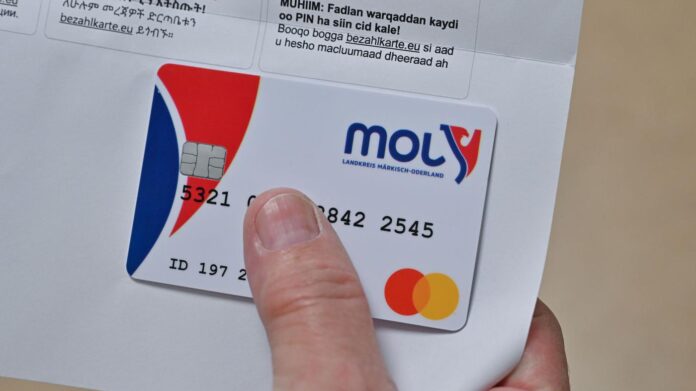
In view of the delay in the nationwide introduction of a payment card for asylum seekers, the district council wants to discuss how to proceed in Brandenburg. The question is whether the districts in Brandenburg will continue to rely on a uniform procedure or, in view of the delay, prefer their own path. This was stated by the chairman of the district council, Siegurd Heinze (independent), to the German Press Agency in Potsdam. He is the district administrator of the Oberspreewald-Lausitz district.
District administrator expects no change of course
Heinze said that on Tuesday the extended board of the district assembly would agree “whether the front would remain united in the uniform introduction of the payment card or whether everyone would go their own way or form several groups.” The chairman of the municipal association does not expect any solo efforts. “I tend to think that things will stay as they are now,” said Heinze. “Because in terms of time, we will not save anything if there are separate tenders now. These also cost time, energy and money.”
In May, Heinze still assumed that the payment cards would be issued in Brandenburg in September or October. Now, due to complaints in the awarding process, it is unclear when this will happen.
Märkisch-Oderland remains the only district in Brandenburg with a payment card
Märkisch-Oderland was the only district to introduce the payment card in May, following its own tender. Brandenburg’s Prime Minister Dietmar Woidke (SPD) said at the end of July: “If it takes too long, then other districts will follow the example of Märkisch-Oderland. There are discussions about this.”
According to the agreed criteria for the payment card, adult asylum seekers should be able to withdraw a maximum of 50 euros per month in cash from their balance on the chip card, while the cash amount for children is limited to 25 euros. However, the design is controversial. The Green-led Ministry of Social Affairs and Integration in Potsdam criticized the restriction to this cash limit.
Complaint in the procurement procedure leads to delays
There are delays in the nationwide introduction of a payment card for refugees due to a complaint filed with the Karlsruhe Higher Regional Court by a bidder who was unsuccessful in the tendering process. This means that no contract can be awarded. According to a spokesperson, the Karlsruhe Higher Regional Court will hear the complaint on October 18. It is still unclear whether a verdict will be made on the same day.
The Hamburg-based company Dataport was commissioned to conduct the tendering process for the planned cross-border cashless payment system for refugees. 14 of 16 federal states agreed to this at the end of January. Bavaria and Mecklenburg-Western Pomerania are going their own way. The card is intended, among other things, to prevent money payments to smugglers or families in the home countries, to relieve municipalities of administrative burdens and to reduce the incentive for irregular migration.
Bavarian court upholds two lawsuits against payment cards
Refugees are already suing against restrictions imposed by the payment card. In an expedited procedure in August, the Nuremberg Social Court ordered the city of Schwabach to transfer two plaintiffs’ monthly support payments back to their accounts – instead of only making them available via the payment card. The decisions are not yet legally binding. In one specific case, the plaintiff stated that the payment card did not allow her to shop cheaply online or in neighboring Nuremberg. She also could not simply join clubs because the transfer of membership fees had to be approved first.
© dpa-infocom, dpa:240909-930-227271/1
This is a message directly from the dpa news channel.
